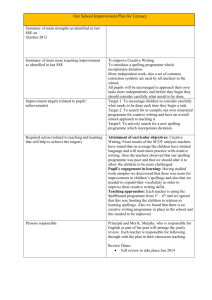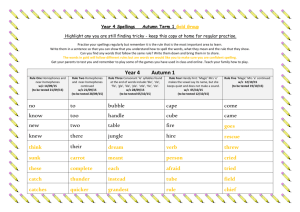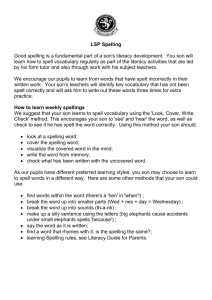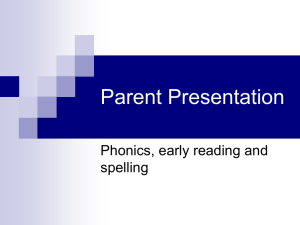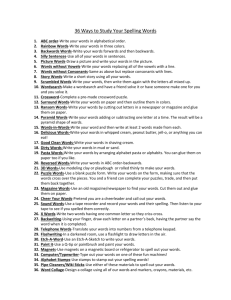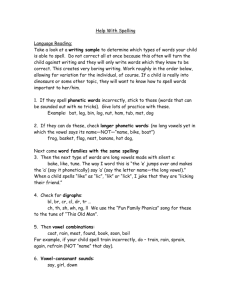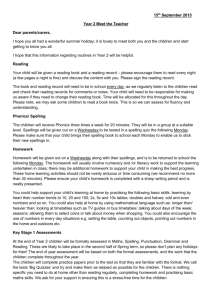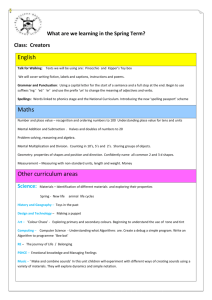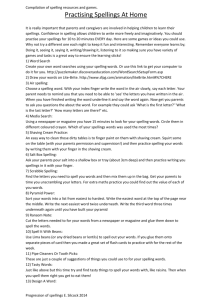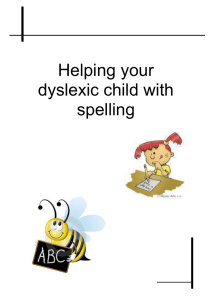HFS Home Learning Training
advertisement
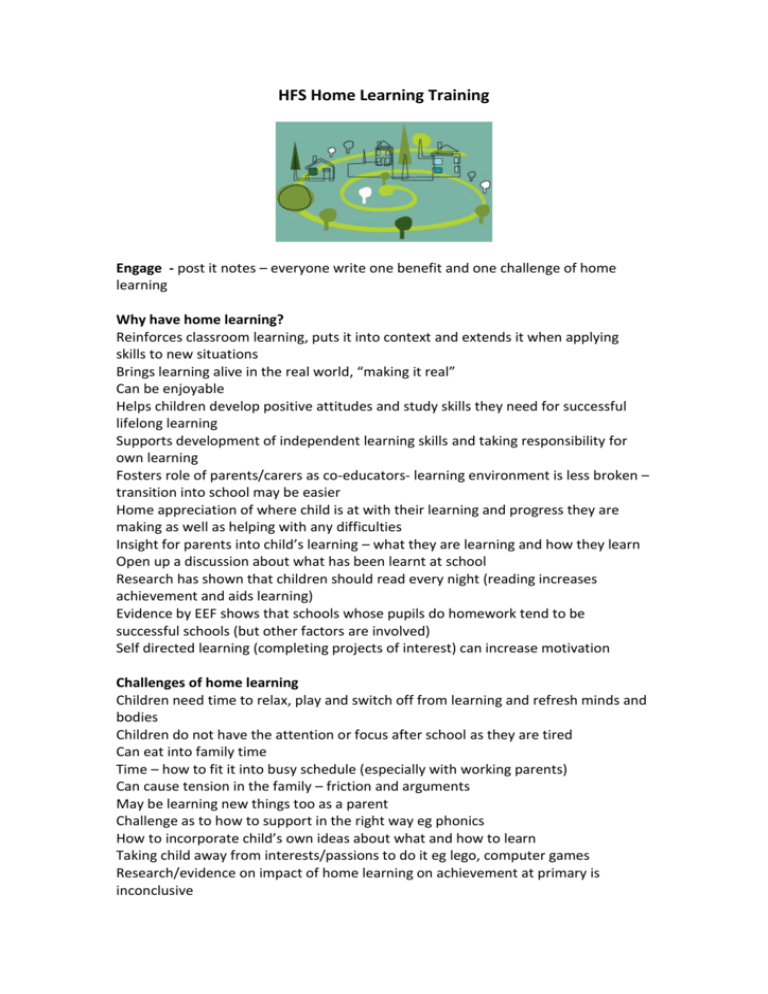
HFS Home Learning Training Engage - post it notes – everyone write one benefit and one challenge of home learning Why have home learning? Reinforces classroom learning, puts it into context and extends it when applying skills to new situations Brings learning alive in the real world, “making it real” Can be enjoyable Helps children develop positive attitudes and study skills they need for successful lifelong learning Supports development of independent learning skills and taking responsibility for own learning Fosters role of parents/carers as co-educators- learning environment is less broken – transition into school may be easier Home appreciation of where child is at with their learning and progress they are making as well as helping with any difficulties Insight for parents into child’s learning – what they are learning and how they learn Open up a discussion about what has been learnt at school Research has shown that children should read every night (reading increases achievement and aids learning) Evidence by EEF shows that schools whose pupils do homework tend to be successful schools (but other factors are involved) Self directed learning (completing projects of interest) can increase motivation Challenges of home learning Children need time to relax, play and switch off from learning and refresh minds and bodies Children do not have the attention or focus after school as they are tired Can eat into family time Time – how to fit it into busy schedule (especially with working parents) Can cause tension in the family – friction and arguments May be learning new things too as a parent Challenge as to how to support in the right way eg phonics How to incorporate child’s own ideas about what and how to learn Taking child away from interests/passions to do it eg lego, computer games Research/evidence on impact of home learning on achievement at primary is inconclusive Language and attitude around home learning At school we are implementing a programme called Looking for Learning which puts the focus of everything we do with the children on learning. We talk about learning rather than work/ doing. What have you learnt today? Learning has positive connotations whereas work often is seem as a chore. If parent is excited about home learning, child generally will be too. Making connections eg 2 times tables- count pairs of socks, 5 times tables – count 5p coins, spelling days of week – look at diary/calendar, if child is obsessed with lego – write words using lego, do times times by grouping lego bricks into threes for tthree times tables This workshop is to support you in making home learning fun and fitting it into your day so part of family time or journey time rather than an add on. Suggestions to make home learning playful Carousel of activities around the room to play with: - Spelling word memory game (two sets of spellings face down and play memory game) - Spelling puzzle (write/type spellings onto page then cut them out into jigsaw) - Tic tac toe (use two spelling words instead of noughts and crosses) - Flour/sand/shaving foam/water spelling - Type it out (type spellings into Word and change font/colour/size etc) - http://www.spellingcity.com/ - ball toss (play catch and have spell a word when catch the ball) - number hunt (times tables questions then answers in words hidden in word search eg 2 x 5= ten ) - spelling word hunt (find spellings in magazine/ book/ newspaper) - Times tables memory game (have question and answer as pair eg 3 x 3 on one card and 9 on the others) - Spotify – times tables songs - Apps for spellings and times and tables eg Spelling test (free), DK times tables, Bright ninja tells time (£1.99) - You tube times tables songs: https://www.youtube.com/watch?v=l_nHs6ql7Ug https://www.youtube.com/watch?v=E7GA0nj-Bms - Times tables games: http://www.bbc.co.uk/skillswise/game/ma13tabl-game-tables-grid-find http://resources.woodlandsjunior.kent.sch.uk/maths/timestable/interactive.htm - puzzle maker http://puzzlemaker.discoveryeducation.com/WordSearchSetupForm.asp?campa ign=flyout_teachers_puzzle_wordcross - swing spell (spell out words with one letter per swing on a swing) - banagrams (spell words with scrabble pieces and try to make them connect) - body spelling (spell words using different body parts) missing word (all words on bits of paper and take one away – which is it? Spell it) Hide and seek (hide questions around room and give child the answer – find the question) Many of today’s activities came from: http://www.scribd.com/doc/77979921/Fun-Spelling-Games-Cards-to-Cut#download Plenary and Further questions What have you learnt this morning? What do you want to learn more about? January February March April May June July August September October November December January February March April May June July August September October November December lion tiger bear snake hippo giraffe 4 2x2 8 2x4 20 2 x 10 14 2x7 12 2x6 2 1x2 Tic tac toe - there and their Tic tac toe - there and their HFS process Home learning is to be given out to children each Friday. It will be read out and discussed with the children and they will then be responsible for putting it into their book bags (support for Younger Years children with this). Home learning is to be collected in on the following Wednesday and reviewed by teachers prior to the next home learning being given out on the Friday. Most activities will be used within learning rather than marked and given back. Big talk home learning will continue to be sent out each Tuesday, in preparation for Big Writing every Thursday (Reception to join Big Writing later in the year). Home learning set in accordance with the HFS Home Learning Policy, the key aim being to provide opportunities for learning to be practised in a real life context at home. Weekly home learning will include: - Daily reading - Spellings (to then be used each week in a Dictation Ditty linked to cross curricular learning where possible) - Maths (core skills eg number bonds, times tables) Some home learning projects may be set for longer periods as long as this is made clear to the children and parents.
